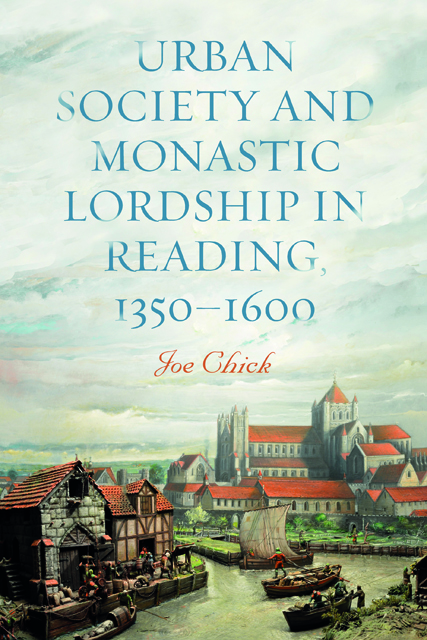Book contents
- Frontmatter
- Dedication
- Contents
- List of Illustrations
- Acknowledgements
- Abbreviations
- Notes on the Text
- Introduction
- 1 Setting and Society
- 2 Political Life
- 3 Economic Life
- 4 Religious Life
- Conclusions and Outlook
- A Social Network Analysis Datasets and Forms of Analysis
- B Trades Categorised by Status
- C Trades Categorised by Sector
- Timeline
- Bibliography
- Index
Conclusions and Outlook
Published online by Cambridge University Press: 17 December 2022
- Frontmatter
- Dedication
- Contents
- List of Illustrations
- Acknowledgements
- Abbreviations
- Notes on the Text
- Introduction
- 1 Setting and Society
- 2 Political Life
- 3 Economic Life
- 4 Religious Life
- Conclusions and Outlook
- A Social Network Analysis Datasets and Forms of Analysis
- B Trades Categorised by Status
- C Trades Categorised by Sector
- Timeline
- Bibliography
- Index
Summary
Lordship in English monastic towns was distinctive for its robustness. No other category of lord was as universally resistant to granting its urban tenants any degree of self-government. Parallels appear in certain other towns, such as Salisbury where the bishop was lord. Yet other episcopal towns, such as Lichfield, attained a degree of freedom that was unattainable for abbatial tenants. Not a single monastic town gained a charter of full self-government until after the Dissolution.
Each lord shaped its own, individual approach to governing its towns, but two factors encouraged a robust approach from monastic lords. The first was financial necessity, being particularly dependent upon the revenue of their estates for their financial security, with mismanagement potentially leading to a house being taken into Crown hands and losing its autonomy over its own affairs. The second was a greater capacity to exert authority. Religious houses often enjoyed vast wealth and estates, exceptional control of the judicial system, influence in both spiritual and temporal affairs, a close relationship with the Crown, and a constant physical presence in their towns. The extent of these assets differed between abbeys but, where all the factors converged, they enabled powerful lordship.
The term ‘robust’ is more appropriate than ‘oppressive’ or ‘repressive’, words that carry connotations of an aggressive attitude that misrepresents the situation, as noted earlier in this book. In fact, older studies did not use these terms, despite some later works having critiqued the traditional association of monastic lords with oppression or repression. Abbeys did not seek to oppress. On the contrary, there are many examples of collaboration, such as the founding of almshouses in Reading by the abbey steward John Lech or the Barking nuns’ involvement in Easter and Innocents’ Day plays. Rather, monastic lords were unwilling to compromise or make concessions when it came to their control of political, economic, and judicial assets. When grievances arose, inhabitants often challenged abbey authority not through violence but litigation or, as seen in late fifteenth-century Reading, through developing their own connections with the royal court.
Yet monastic lordship was not immune to change. Out of the many factors reinforcing abbatial authority, political allegiances were key. At the outset of the era, royal patrons defended monastic powers whenever they came into question, epitomising the traditional ideal of the Church and Crown as the ‘two swords’.
- Type
- Chapter
- Information
- Urban Society and Monastic Lordship in Reading, 1350-1600 , pp. 180 - 186Publisher: Boydell & BrewerPrint publication year: 2022



